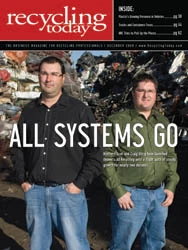ISRI Opposes Black Liquor Tax Incentives
The Institute of Scrap Recycling Industries Inc. (ISRI), Washington, D.C., is calling on Congress to rescind the unintended tax incentives from “black liquor” afforded to paper mills that use virgin materials, creating a financial disincentive to use recovered fiber.
Recently, paper companies have tapped into $6.6 billion in tax credits available under the “Alternative Fuels Provision” of the 2005 highway bill intended to support the use of alternative fuels for transportation.
In a letter to Sen. Max Baucus, chair of the Senate Finance Committee, and Sen. Charles Grassley, ranking minority member of the committee, Robin Wiener, ISRI president, writes, “ISRI strongly opposes the black liquor tax incentives unintentionally afforded to virgin paper mills. This issue is of great concern to paper recyclers who have indicated the black liquor tax credit impedes paper recycling by providing paper mills that utilize virgin materials a competitive advantage over mills that utilize recovered fiber in paper production.”
Wiener notes that trend analyses from RISI, which specializes in forecasts and analysis on the global forest products industry, find that production of virgin containerboard increased as a result of the tax credit while production of recycled containerboard decreased.
Wiener also writes that when the credit expires Dec. 31, 2009, the cellulosic biofuel producer credit, afforded by section 40(b)(6) of the Internal Revenue Code, will provide a more generous black liquor credit estimated at $1.01 per gallon through Dec. 31, 2012.
Wiener’s letter requests that both of these “egregious tax credits never intended by the Congress” be ended.
ORPET to Open Plastics Recycling Plant in Oregon
ORPET, a partnership between private investors headed by Dennis Denton and Tom Leaptrott and the Oregon Beverage Recycling Cooperative (OBRC), the predominant administrator of Oregon’s Bottle Bill, has announced plans for a polyethylene terephthalate (PET) plastic bottle recycling facility near St. Helens, Ore. The plant will be operational in the second quarter of 2010, creating 50 local jobs, according to a press release from the company.
The facility will convert PET bottles collected through Oregon’s Bottle Bill into raw material for manufacturing, construction and packaging. ORPET says it plans to market these products to a variety of Northwest companies, providing a local supply for regional businesses and eliminating the carbon footprint associated with exporting.
Denton, organizing group partner of ORPET and founder of Denton Plastics, based in Portland, Ore., says, “Oregon’s innovative Bottle Bill and the public’s commitment to recycling can benefit both the environment and our region’s economy. Rather than ship these materials overseas, we can put them to work right here in the Northwest, with zero negative environmental impact.”
According to ORPET, its business model leverages a management team with more than 25 years of experience in recycling and materials management and OBRC’s expertise with Oregon’s Bottle Bill.
“ORPET is positioned to play an integral role in Oregon’s recycling infrastructure,” says John Andersen, OBRC president. “This project magnifies the impact of the Bottle Bill by supporting the increase in PET bottle collections, while simultaneously stimulating our economy and reducing our carbon footprint.”
NAPCOR, APR Release Recycling Report
The National Association for PET Container Resources (NAPCOR), Sonoma, Calif.; the Association of Postconsumer Plastic Recyclers (APR), Washington, D.C; and the PET Resin Association (PETRA), New York City, have released the “2008 Report on Postconsumer PET Container Recycling Activity.” The full report, available at www.napcor.com and www.plasticsrecycling.org, notes a PET recycling rate of 27 percent for the year.
This is the highest recycling rate in more than 10 years and represents an increase of 9.8 percent compared with the 2007 rate of 24.6 percent, according to the study. More than 1.45 billion pounds of PET bottles were collected in the United States in 2008, the highest PET container collection volume recorded to date, the associations say.
The 2008 report details end-uses for a record 915 million pounds of recycled PET in domestic manufacturing.
“It is very satisfying to see this significant jump in the PET recycling rate,” says Tom Busard, NAPCOR chairman and vice president, global procurement and material systems, Plastipak Packaging, Plymouth, Mich.
“Using recycled PET in the manufacture of goods and packaging is energy- and resource-efficient and a good example of sustainable practice,” he adds. “We are committed to working with our industry partners to meet the increased demand from the manufacturing applications that use—or would like to use—recycled PET.”

Explore the December 2009 Issue
Check out more from this issue and find your next story to read.
Latest from Recycling Today
- Ferrous market ends 2024 in familiar rut
- Aqua Metals secures $1.5M loan, reports operational strides
- AF&PA urges veto of NY bill
- Aluminum Association includes recycling among 2025 policy priorities
- AISI applauds waterways spending bill
- Lux Research questions hydrogen’s transportation role
- Sonoco selling thermoformed, flexible packaging business to Toppan for $1.8B
- ReMA offers Superfund informational reports





